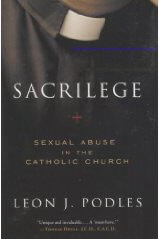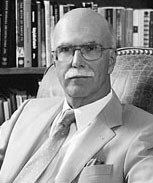|
|||
| SACRILEGE Sexual Abuse in the Catholic Church | |||
|
By Leon J. Podles
Crossland Press, 2007
Reviewed by Thomas P. Doyle
|
|||
|
I am not surprised by the arrogant dismissal of Lee's book by clerics like Fr. Neuhaus. (Cf. review First Things) Lee Podles’ book is not some abstract theological discussion on controversial points of theory. His book is about the horrendous assault on persons—the bodies, emotions, psyches, and souls of thousands of vulnerable people by Catholic bishops and priests. It is also about the unspeakable spiritual harm done to these same people and their families by the Catholic hierarchy because their demonstrable uncaring and re-victimizing ploys and reactions. Richard Neuhaus, a voice of many bishops, used the word "rant" in his critique of this book. How less indignantly can any decent, caring person respond in the face of the Catholic clerical debacle the public has witnessed over the past three decades? How much time has Neuhaus or bishops of his ilk ever spent with victims—really hearing them and their stories? Equally shocking and disturbing as the stories of the victims are the conversations I have had with countless mothers and fathers. Hearing their feelings—shock, anger, sadness, resentment—when they learned that their child had been anally raped by a priest or bishop. These experiences can never be forgotten and should be the content of bishops’ nightmares. It is a Catholic and clerical Holocaust—slaying the souls of countless children under the aegis of a self-serving hierarchy.
Neuhaus is right when he identifies the problem as "fidelity, fidelity, fidelity." He means fidelity to chastity and celibacy vows that, of course, are unobserved by the majority of bishops and priests in addition to the highly compulsive sexually dysfunctional clerics who cannot turn urges off and on. The Boston Globe’s revelations in 2002 was the flash-point that turned the public's attention and the hierarchy's capitulation to something they had been trying to hide, ignore, and lie about. Now exposed is the real infidelity of the pope's, cardinals', and bishops' responses. Had they been faithful to the fundamental demands of their Christian and Episcopal vocations to "do to the least of my brothers what you do unto me" things would be radically different. Those high-and-mighty self-righteous critics who refuse to look this horrible saga of clergy abuse straight in the eye fail to know the damage from clerical sexual abuse. The terrible consequences have not abated. The anger of victims and their families is not primarily directed at the actual perpetrators—they can be forgiven. The everlasting and unforgettable—and unforgivable—resentment is reserved for the hierarchy and the church system that not only failed to protect them, respond to them, but also even rejected them. The bishops and their toadies are still trying to defend the indefensible—themselves and their infidelity. Thomas P Doyle The following is a Review by Dan Cere Assistant Professor of Religion, Ethics and Public Policy McGill University I have encountered a number of devout and orthodox Catholics who have struggled with Sacrilege. They find it deeply disturbing. They are tempted to turn their eyes from it. Sacrilege is a book that goes beyond description, beyond narrative, beyond theory. Just as Gibson’s Passion was an icon of the malignant brutality of sin crucifying innocence, Sacrilege is another “stomach-turning” revelation of the vicious malignancy of sin. Sacrilege stirs the same response. Shock, horror, a desire to turn away. And most of us have, in various ways, turned our faces away from this malignancy … some of us have fled. In some ways Sacrilege hits closer to home than Gibson’s Passion. The innocent victims were children in our midst. Those who have brutally crucified them were trusted leaders, “our” shepherds. The authorities who dutifully washed their hands were our bishops. The complacent and approving crowd was the laity … the crowd was us. And Sacrilege does reveal a malaise within the laity. The laity should be the first line of protection for children. But, we have not been the moral gatekeepers for our children, we have not been protecting them. We have been the crowd, standing aside, retreating, not wanting to see, refusing to intervene. Fr. Neuhaus’s reaction to Sacrilege reminded me of an incident mentioned in the book. When sexual abuse victim, Mark Serrano confronted Bishop Frank Rodimer with the question “Where’s your moral indignation?” The bishop was baffled by the request: “…I don’t get it. What do you want?” I fear that this will be the response that Sacrilege will evoke from the Catholic community: “we don’t get it… What do you want?” Leon’s comments on the Rodimer incident underscore the one thing that is necessary before evil: “What Serrano wanted Rodimer to do is to behave like a man with a heart, a heart outraged by evil. But Rodimer couldn’t; his inability to feel outrage was a quality that helped make him a bishop. He would never get into fights, never rock the boat, never “divide” but only “unify.” Rodimer could not understand why he should feel deep anger at evil, at the violation of the innocent….” (467) The history that Sacrilege narrates calls for moral outrage. Leon quotes Child psychiatrist Gilbert Kilamn, “What amazes me is the lack of outrage that the [C]hurch needs feels when its good work is being harmed. So, if there is anything the [C]hurch needs to know, it needs to know how to be outraged.” (467) Sacrilege is a litany, a litany of horror, that requires each one of us, including Fr. Neuhaus, to ask: “Have I behaved “like a man with a heart, a heart outraged by evil?” The book is a testament to the fact that at least one layman and father has responded “like a man with a heart.” Dan Cere Assistant Professor of Religion, Ethics and Public Policy McGill University |
|||


 <
Lee Podles describes the living nightmare in the
midst of our life as Catholics, Christians, and
American citizens. Many victims, men and women,
have educated us to the reality. Besides, I have
studied thousands of pages of “secret files”
that the Church has been forced to cough up in
discovery during the legal process in cases where
bishops continue the pretense of their ignorance and
their charade of innocence. The truth comes out
during litigation filed in the public domain (and
Grand Jury investigations), not in the pious and
irrelevant statements by Church PR people. This
truth, held so long in secret, is profoundly
shocking and disturbing.
<
Lee Podles describes the living nightmare in the
midst of our life as Catholics, Christians, and
American citizens. Many victims, men and women,
have educated us to the reality. Besides, I have
studied thousands of pages of “secret files”
that the Church has been forced to cough up in
discovery during the legal process in cases where
bishops continue the pretense of their ignorance and
their charade of innocence. The truth comes out
during litigation filed in the public domain (and
Grand Jury investigations), not in the pious and
irrelevant statements by Church PR people. This
truth, held so long in secret, is profoundly
shocking and disturbing.